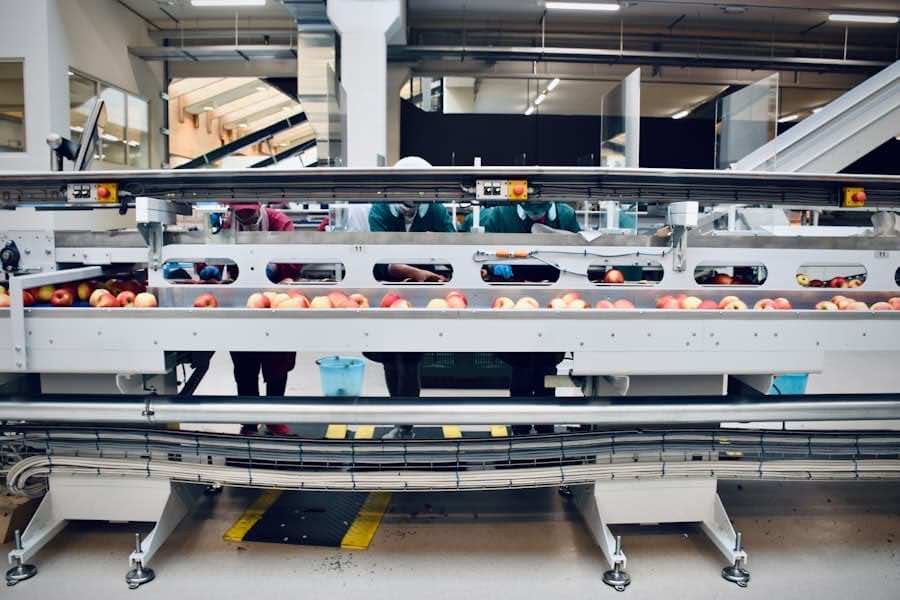The landscape of manufacturing is undergoing a profound transformation, driven by the advent of smart technologies that are reshaping traditional processes. Smart manufacturing, characterised by the integration of advanced technologies such as the Internet of Things (IoT), artificial intelligence (AI), and robotics, is revolutionising how products are designed, produced, and delivered. This shift is not merely a trend but a fundamental change in the manufacturing paradigm, enabling companies to enhance efficiency, reduce costs, and improve product quality.
As industries strive to remain competitive in an increasingly globalised market, understanding these trends becomes essential for stakeholders at all levels. The rise of smart manufacturing is also closely linked to the concept of Industry 4.0, which emphasises the digital transformation of manufacturing processes. This new era is marked by the convergence of physical and digital systems, where machines communicate with each other and with human operators in real-time.
The implications of this transformation are vast, affecting everything from supply chain management to customer engagement. As manufacturers embrace these technologies, they are not only optimising their operations but also creating new business models that leverage data and connectivity to drive innovation.
Summary
- Smart manufacturing is revolutionizing the industry by integrating advanced technologies to improve efficiency and productivity.
- The Internet of Things (IoT) plays a crucial role in smart manufacturing by connecting machines and devices to gather and analyze data for better decision-making.
- Artificial Intelligence and Machine Learning are transforming smart manufacturing by enabling predictive maintenance, quality control, and process optimization.
- Robotics and Automation are essential in smart manufacturing for repetitive tasks, increasing precision, and reducing human error.
- Data Analytics and Predictive Maintenance are key components of smart manufacturing, allowing for proactive equipment maintenance and improved operational efficiency.
Internet of Things (IoT) in Smart Manufacturing
The Internet of Things (IoT) plays a pivotal role in the evolution of smart manufacturing by enabling devices and machines to connect and communicate over the internet. This connectivity allows for real-time monitoring and control of manufacturing processes, leading to enhanced operational efficiency. For instance, sensors embedded in machinery can collect data on performance metrics such as temperature, vibration, and energy consumption.
This data can then be analysed to identify inefficiencies or potential failures before they occur, thereby minimising downtime and maintenance costs. Moreover, IoT facilitates improved supply chain visibility. By integrating IoT devices throughout the supply chain, manufacturers can track inventory levels, monitor shipment conditions, and predict delivery times with greater accuracy.
For example, companies like Siemens have implemented IoT solutions that provide real-time insights into their supply chains, allowing them to respond swiftly to changes in demand or disruptions. This level of visibility not only enhances operational agility but also fosters stronger relationships with suppliers and customers by ensuring timely delivery and quality assurance.
Artificial Intelligence and Machine Learning in Smart Manufacturing

Artificial intelligence (AI) and machine learning (ML) are at the forefront of smart manufacturing innovations, providing manufacturers with powerful tools to analyse vast amounts of data generated by IoT devices. These technologies enable predictive analytics, which can forecast equipment failures or maintenance needs based on historical data patterns. For instance, General Electric has successfully employed AI algorithms to predict when turbines will require maintenance, significantly reducing unplanned outages and optimising operational efficiency.
In addition to predictive maintenance, AI and ML can enhance quality control processes. By analysing data from production lines in real-time, these technologies can identify defects or deviations from quality standards almost instantaneously. For example, companies like Bosch have integrated AI-driven visual inspection systems that utilise computer vision to detect flaws in products during the manufacturing process.
This not only improves product quality but also reduces waste and rework costs, ultimately leading to higher customer satisfaction.
Robotics and Automation in Smart Manufacturing
Robotics and automation are integral components of smart manufacturing, enabling manufacturers to streamline operations and improve productivity. Advanced robotic systems can perform repetitive tasks with precision and speed that far exceed human capabilities. For instance, automotive manufacturers such as Toyota have long relied on robotic assembly lines to enhance production efficiency while maintaining high-quality standards.
These robots can work alongside human operators in collaborative environments, known as cobots, which combine the strengths of both machines and humans. The implementation of automation extends beyond assembly lines; it encompasses various aspects of manufacturing processes including material handling, packaging, and logistics. Companies like Amazon have revolutionised warehouse operations through the use of automated guided vehicles (AGVs) that transport goods efficiently within their facilities.
This level of automation not only accelerates order fulfilment but also reduces labour costs and minimises human error. As robotics technology continues to advance, manufacturers are likely to see even greater integration of automated systems across their operations.
Data Analytics and Predictive Maintenance in Smart Manufacturing
Data analytics is a cornerstone of smart manufacturing, providing insights that drive decision-making and operational improvements. The ability to collect and analyse data from various sources—such as machines, sensors, and supply chain partners—enables manufacturers to make informed decisions that enhance productivity and reduce costs. For example, companies like Honeywell utilise advanced analytics platforms to monitor equipment performance in real-time, allowing them to optimise production schedules based on actual machine capabilities.
Predictive maintenance is one of the most significant applications of data analytics in smart manufacturing. By leveraging historical data and real-time monitoring, manufacturers can predict when equipment is likely to fail or require maintenance. This proactive approach not only minimises unplanned downtime but also extends the lifespan of machinery.
For instance, Rolls-Royce employs predictive maintenance strategies for its aircraft engines by analysing data collected during flights. This allows them to schedule maintenance activities more effectively, ensuring that engines are serviced only when necessary while maximising operational availability.
3D Printing and Additive Manufacturing in Smart Manufacturing

3D printing, or additive manufacturing, represents a revolutionary shift in how products are designed and produced within the realm of smart manufacturing. This technology allows for the creation of complex geometries that would be impossible or prohibitively expensive to achieve through traditional manufacturing methods. Industries such as aerospace and healthcare have embraced 3D printing for its ability to produce lightweight components and customised medical devices tailored to individual patient needs.
For example, companies like Boeing have utilised 3D printing to manufacture parts for their aircraft, significantly reducing material waste and production time. The ability to produce components on-demand also enhances supply chain flexibility by minimising inventory costs associated with traditional manufacturing processes. Furthermore, 3D printing enables rapid prototyping, allowing manufacturers to iterate designs quickly based on feedback or testing results.
This agility fosters innovation by enabling companies to bring new products to market faster than ever before.
Cybersecurity in Smart Manufacturing
As smart manufacturing becomes increasingly reliant on interconnected systems and data exchange, cybersecurity has emerged as a critical concern for manufacturers. The integration of IoT devices and cloud-based solutions exposes manufacturing operations to potential cyber threats that could disrupt production or compromise sensitive information. Consequently, manufacturers must adopt robust cybersecurity measures to safeguard their operations against potential attacks.
For instance, companies like Schneider Electric have implemented comprehensive cybersecurity frameworks that encompass risk assessment, threat detection, and incident response strategies tailored specifically for industrial environments. These frameworks not only protect against external threats but also address vulnerabilities within internal systems. Additionally, employee training programmes focused on cybersecurity awareness are essential for fostering a culture of security within organisations.
By prioritising cybersecurity measures, manufacturers can mitigate risks associated with digital transformation while ensuring the integrity of their operations.
Sustainable and Green Manufacturing Practices in Smart Manufacturing
Sustainability has become a paramount consideration in modern manufacturing practices as industries seek to minimise their environmental impact while meeting consumer demand for eco-friendly products. Smart manufacturing technologies facilitate sustainable practices by optimising resource utilisation and reducing waste throughout the production process. For example, manufacturers can leverage IoT sensors to monitor energy consumption in real-time, identifying areas where energy efficiency can be improved.
Moreover, the adoption of circular economy principles is gaining traction within smart manufacturing frameworks. Companies like Unilever are exploring ways to design products with recyclability in mind while implementing closed-loop systems that repurpose waste materials into new products. This approach not only reduces environmental impact but also creates new revenue streams through innovative product offerings.
As consumers increasingly prioritise sustainability in their purchasing decisions, manufacturers that embrace green practices will likely gain a competitive advantage in the marketplace. In conclusion, the trends shaping smart manufacturing are multifaceted and interconnected, encompassing advancements in technology that drive efficiency, quality, and sustainability. As industries continue to evolve in response to these trends, manufacturers must remain agile and proactive in adopting innovative solutions that align with their strategic goals while addressing the challenges posed by an ever-changing landscape.
Smart manufacturing trends are revolutionising the way businesses operate, with technology playing a key role in driving efficiency and productivity. One related article that delves into the importance of employee motivation in achieving success in the workplace can be found here. Motivated employees are crucial in implementing smart manufacturing practices and ensuring that the business remains competitive in the ever-evolving market.
FAQs
What is smart manufacturing?
Smart manufacturing refers to the use of advanced technology, such as automation, data analytics, and artificial intelligence, to improve the efficiency, productivity, and flexibility of manufacturing processes.
What are the trends in smart manufacturing?
Some of the key trends in smart manufacturing include the adoption of Industrial Internet of Things (IIoT), the use of big data and analytics, the implementation of advanced robotics and automation, and the integration of digital twins and augmented reality.
How does smart manufacturing benefit businesses?
Smart manufacturing can benefit businesses by improving operational efficiency, reducing production costs, increasing product quality, enabling predictive maintenance, and providing real-time insights for better decision-making.
What are the challenges of implementing smart manufacturing?
Challenges of implementing smart manufacturing include the high initial investment, the need for skilled workforce, cybersecurity risks, interoperability issues between different technologies, and the potential resistance to change within the organization.
What industries can benefit from smart manufacturing?
Industries such as automotive, aerospace, electronics, pharmaceuticals, food and beverage, and consumer goods can benefit from smart manufacturing by improving their production processes, reducing waste, and enhancing product quality.
